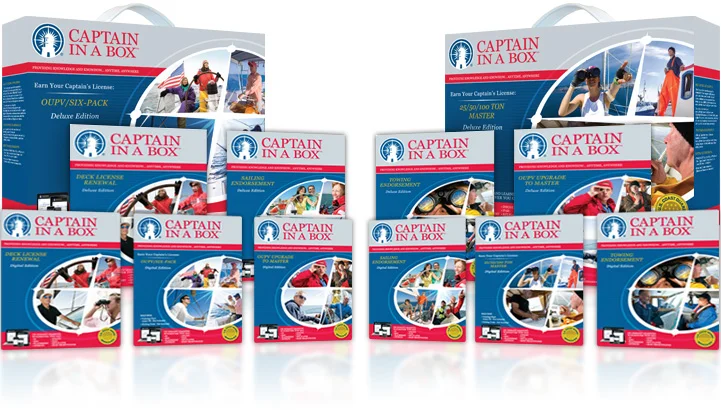This weekend is the Annapolis Boat Show — perhaps the biggest yearly boating event on the East Coast. Essentially every boatbuilding company and boat product has a presence there, and Jon and I have been nerdily been looking forward to it for months, making a long list of boat-show discounted purchases we were ready to make in the next few days.
One of those purchases was Captain in a Box. I’ve been eyeing the online course, which certifies you as a professional captain, for more than two years. As a woman, I’ve noticed that the ratio of female captains to male captains that I’ve met is woefully low. I’ve also noticed that even though Jon and I are learning how to sail together, people often ask him if he’s working toward a captain’s license, and almost never ask me. The course has been on my gift wish list and a captain's license on my bucket list, for awhile now.
So I was pretty excited to see Captain in a Box, also known as the Mariner’s Learning System, at the show. (Little did I know Jon was not — he had emailed the founder a while back with a few questions that were never answered, even though he was auto-subscribed to the company’s newsletter. Gross.)
Anyway, the creator of the course, Bob Figular, gave us an admirable sell on the course and we were ready to throw down. But something was bothering me.
First, he was only selling Jon. He didn’t look me in the eye, not once. He didn’t even acknowledge that I might be interested in the course too, until Jon asked about buying two courses at once.
This is a cardinal sin of boating sales to us. We’ve passed on making huge purchases, like our sails, simply because the salesperson didn’t acknowledge me, one half of our boating unit, and half of our purchasing and decision making power, while making a hard sell. Apart from being personally insulting, my theory is that if you don’t see half the market in front of you, you’re not good at your job. And if your company doesn’t train or encourage you to see a woman as an equal purchaser and partner, they’re going to miss other things and deliver an inferior product.
I’ve also noticed that, with this particular product, there were only guys — old white guys — on their coursework and marketing materials. In more updated imagery, there are one or two photos of women, but almost always accompanied by a man or in groups, or wearing copiously large life jackets like they can't handle themselves. Since Bob wasn’t trying at all to engage me, I began to flip through his brochures as he talked to my husband, and I noticed something even more concerning — there wasn’t a single photo of a person of color… anywhere.
It sucks that he included visuals of women as almost solely in the role of “helpers”. But at least women were represented in his materials. I'll take it! However, there were only white women. Only white people. Not a single image of anyone of any other race, for a course that touts itself to be geared toward “recreational boaters, educational institutions and corporations and professional mariners.”
This seriously pisses me off, because boating is, in many ways, on the precipice of dying if it doesn’t make itself available to a wider, younger, more diverse group of people. People don’t pursue things if they don’t feel welcome or see themselves reflected in it, period.
And I don’t want to see boating, something I love, disappear.
We can fix that by consciously opening up opportunities and marketing to a wider audience, outside of old white guys. By making recreation and careers with boats feel accessible and welcoming. By waking up to the fact that the narrow mindset of marketing to rich old white guys excludes a huge group of people, who have purchasing power and career investments to make.
I understand the narrow marketing of multi-million dollar yachts. I don’t like it, but I understand that for a variety of entrenched socio-economic reasons, it’s likely that it’s going to be a white, CEO-level dudebro who can afford a very expensive boat.
What I don’t understand is consciously limiting the audience and marketing of products, especially this product, that serves as a gateway to a lifelong love and income. Especially when your product is geographically independent and flexible. Your product can literally be used by anyone and could make the difference between locking in a new generation of boaters or not.
So, as he wrapped up conversation with my husband, I piped up (he looked almost startled, like he forgot I was even standing there.)
“May I make a suggestion for your marketing materials,” I said nicely. “Next time you make a run of these, you may want to consider including a more diverse group of people, especially people of color.”
He became immediately defensive. “I have all kinds of people in my catalogues. Men, women, young old…”
I didn’t even point out the misogynistic way he pictured women in his materials and instead said, “Yes, but they’re all white.”
“I’m a marketer, I'm going to market to my customer base,” he replied.
I began to explain that he literally makes his customer base by opening up boating as a viable career option for an affordable price. He interrupted (ugh) and said, “this is for people who have spent 300 or more hours on the water for a professional certification. There aren't people like that who need my product.”
And this, my friends, is what’s currently wrong with the boating industry.
I told him respectfully that he had lost us as customers and we walked away. He yelled a loud "FUCK" after us.
Despite two years of wanting this product, I will not, nor will I ever, support Bob Figular by purchasing it, and will be pursuing other coursework for obtaining my captain’s license.
I hope that if you’re considering his product, you take a second thought before financially supporting his entrenched small-mindedness.
I also encourage you, if you’re at the boat show this weekend, to drop by and suggest he include more women and people of color in his marketing. If you’re a woman, make sure he meets your eye. Maybe if enough people speak up to vendors like him and others, we can see a stronger, more diverse boating community in the future.

